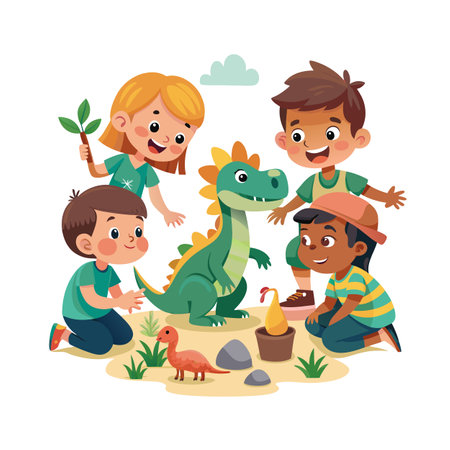Introduction to Eco Campsites in the UK
As families across the UK seek meaningful ways to spend time together, eco campsites have emerged as a popular choice for those looking to blend outdoor adventure with environmental responsibility. A family-friendly eco campsite offers more than just a pitch for your tent; it provides an opportunity to teach children about sustainable living while enjoying Britain’s beautiful countryside. In the UK, what sets an eco campsite apart is its commitment to minimising environmental impact through practices like renewable energy use, waste reduction, water conservation, and support for local biodiversity. Many sites follow standards set by organisations such as the Green Tourism Business Scheme and local councils, ensuring that their operations align with both national and regional green initiatives. From solar-powered showers to recycling facilities and nature-friendly activities, these campsites provide practical examples of how families can make greener choices in their everyday lives. By choosing an eco campsite, families not only enjoy a unique holiday experience but also contribute to preserving the natural beauty of the UK for future generations.
Choosing a Family-Friendly Green Campsite
Finding the right eco campsite for your family is an essential part of ensuring a memorable and educational outdoor experience. In the UK, there are plenty of options that blend sustainable practices with family-friendly amenities, but it’s important to know what to look for before booking your pitch.
Key Factors to Consider
When searching for a campsite, keep these crucial points in mind:
- Amenities: Look for sites that offer child-safe play areas, accessible toilets, baby changing facilities, and communal spaces where families can gather.
- Location: Choose campsites close to natural attractions like parks, forests, or lakes. Proximity to walking trails and cycling routes allows kids to connect with nature safely.
- Sustainable Practices: Prioritise campsites that use renewable energy sources, have effective recycling systems, encourage waste reduction, and support local wildlife habitats.
Comparison Table: What to Look For
| Campsite Feature | Why It Matters | Eco-Friendly Example |
|---|---|---|
| Renewable Energy Use | Lowers environmental impact and teaches children about clean energy sources. | Solar panels powering site lights and showers. |
| Recycling Facilities | Makes it easy for families to separate waste and learn about responsible disposal. | Clearly marked bins for paper, plastic, food waste. |
| Onsite Education Programmes | Offers workshops or guided nature walks focused on conservation topics. | Wildlife identification sessions or composting demos. |
| Safe Play Areas | Keeps children entertained and secure within the site boundaries. | Naturally landscaped playgrounds using sustainable materials. |
| Water Conservation Measures | Teaches children the value of protecting resources through everyday actions. | Rainwater harvesting systems for toilets and washing up. |
The Importance of Local Engagement
Selecting a campsite that supports local communities—such as sourcing produce from nearby farms or collaborating with regional conservation groups—not only reduces travel emissions but also enriches your family’s experience by connecting you more deeply with British countryside traditions.
Top Tip:
Before booking, check reviews from other families regarding safety measures, cleanliness, and how effectively green principles are put into practice. A truly family-friendly eco campsite will openly share their sustainability commitments and be eager to welcome children as future stewards of the environment.

3. Practical Green Camping Habits for Children
One of the greatest benefits of family-friendly eco campsites across the UK is the opportunity to instil practical green habits in children from a young age. Rather than simply talking about sustainability, these campsites provide an engaging environment where children can participate in hands-on activities that foster respect for nature. For example, many sites encourage families to separate their rubbish and recycling together, helping kids understand the importance of reducing waste and protecting local wildlife habitats. Nature scavenger hunts are another popular activity—children learn to identify native plants, insects, and animals, while also being reminded not to disturb nests or pick wildflowers. Water conservation can be taught through simple tasks like collecting rainwater for washing up or using eco-friendly soaps. Campsites often offer bug hotels or bird box workshops, letting children build shelters for wildlife and observe creatures in their natural setting. Even basic routines, such as leaving no trace after meals or respecting quiet zones to avoid disturbing animals, teach lasting lessons about responsibility and stewardship. These enjoyable and educational camping practices not only make holidays memorable but also nurture environmentally conscious attitudes that children will carry with them long after returning home.
4. Eco-Friendly Camping Gear and Packing Advice
Embracing green camping as a family begins with thoughtful choices about the gear you bring and how you pack. Using environmentally conscious equipment not only reduces your impact on nature but also sets an example for children, showing that even small actions matter. Below, we provide practical suggestions for eco-friendly gear and efficient packing to minimise waste during your stay at British family campsites.
Choosing Sustainable Camping Gear
When selecting camping equipment, opt for products made from recycled or renewable materials. Look for items designed to last, reducing the need for frequent replacements. Consider the following essentials:
| Item | Eco-Friendly Option |
|---|---|
| Tent | Recycled fabric, aluminium poles, PVC-free coatings |
| Sleeping Bags & Mats | Organic cotton, recycled synthetic insulation |
| Cooking Equipment | Stainless steel or bamboo utensils; reusable crockery |
| Lamps & Torches | Solar-powered or rechargeable models |
| Toiletries | Biodegradable soaps; refillable containers |
Packing Light: Tips to Minimise Waste
Packing lightly is both practical and eco-friendly. It means less fuel used in transport and fewer unnecessary items that might end up as waste. Here are some strategies tailored for UK family campers:
- Plan meals carefully: Prepare a menu ahead of time and bring only what’s needed. Use airtight containers for snacks to avoid single-use plastics.
- Avoid disposables: Bring reusable water bottles, cutlery, and plates. Opt for beeswax wraps instead of cling film.
- Layer clothing: Pack versatile clothing suitable for unpredictable British weather, favouring quality over quantity.
- Shared family items: Share larger essentials like cookers or tarps rather than duplicating gear.
Waste Reduction Checklist
- Pack rubbish bags to take all litter home – “leave no trace” is key.
- Select local produce where possible to cut down on packaging and support British farmers.
- Bring a compostable bin liner for food scraps if permitted by campsite rules.
Cultivating Green Habits Together
Your approach to packing provides a hands-on lesson in sustainability for children. Involving them in gear selection and packing decisions encourages mindfulness about resources – an invaluable lesson they’ll carry beyond the campsite.
5. Respecting Local Environments and Wildlife
One of the core values at family-friendly eco campsites across the UK is showing respect for local environments and wildlife. Teaching children to interact thoughtfully with the British countryside is both a privilege and a responsibility. When exploring lush woodlands, rolling hills, or coastal paths, families can foster appreciation for native flora and fauna by following a few essential guidelines.
Leave No Trace
Encourage your children to adopt the ‘leave no trace’ principle. This means taking all rubbish home, sticking to established paths to avoid trampling sensitive plants, and never disturbing natural habitats. Remind youngsters that everything in nature has its place—from wildflowers to fallen branches—so it’s best to look, admire, and leave things as they are found.
Wildlife Watching Etiquette
British wildlife is incredibly diverse, from red squirrels in Scotland to hedgehogs in English meadows. Teach your family to observe animals quietly and from a distance, without feeding them or trying to touch. Using binoculars for birdwatching or identifying animal tracks can be fun and educational activities that don’t disrupt their natural behaviours.
Respecting Flora
Children often love picking flowers or collecting leaves, but it’s important to explain why this should be avoided in protected areas. Many British wildflowers are under threat, so encourage little ones to take photos instead of souvenirs. Point out how some plants provide food or shelter for insects and birds—helping them see the bigger picture of biodiversity.
Being Mindful Around Livestock and Farmland
The British countryside is often shared with working farms. Remind your family to close gates behind them, keep dogs on leads near livestock, and avoid disturbing farm animals. Farmers rely on these practices to ensure the safety of their animals and crops, making this an excellent lesson in community respect.
By guiding children on how to interact respectfully with local environments and wildlife, you help nurture future stewards of the countryside. These mindful habits not only protect Britain’s natural beauty but also create lasting memories rooted in care and consideration for the world around us.
6. Fun Green Activities and Challenges
Embracing eco camping is not just about reducing waste or choosing the right campsite—it’s also a brilliant opportunity to inspire children through engaging activities that foster teamwork and environmental awareness. Family-friendly eco campsites across the UK often encourage playful learning, making sustainability both accessible and memorable for youngsters.
Eco-Themed Scavenger Hunts
One classic activity is the eco scavenger hunt. Create a list of natural items found around your campsite—such as pine cones, wildflowers (only those that have fallen), feathers, or certain types of leaves—and challenge your family to find them without disturbing wildlife. Add questions like “Can you spot something that helps insects?” or “Find an example of animal tracks” to spark curiosity about nature’s delicate balance.
Sustainable Campfire Cook-Offs
Cooking outdoors becomes a green adventure with a sustainable campfire cook-off. Task each family member with preparing a simple meal using local, organic ingredients and minimal packaging. Award points for creativity, taste, and how little waste is produced. This encourages kids to think critically about food choices and their environmental impact.
Recycling Relay Races
Turn recycling into a friendly competition by setting up bins for paper, plastics, glass, and compostables. Gather clean recyclables and let teams race to sort them correctly in the fastest time possible. Discuss why sorting matters and what happens to materials after they leave the campsite.
Nature Art Challenges
Encourage children to collect natural materials (fallen leaves, twigs, pebbles) and create temporary art installations—think leaf mandalas or pebble mosaics—on the ground. Highlight the principle of ‘leave no trace’ by ensuring all items are returned to nature afterwards.
Family Green Pledges
Wrap up your trip with each family member making an eco pledge—perhaps taking shorter showers, picking litter, or switching off lights at home. Writing these down or sharing them around the campfire reinforces long-term commitment to protecting the environment.
These activities aren’t just fun—they’re formative experiences that weave sustainability into everyday life. By combining playfulness with purpose, UK families can nurture a new generation of responsible campers who cherish and defend our natural world.
7. Wrap-up: Building Lifelong Green Habits
Creating lasting eco-friendly habits in children is one of the most meaningful outcomes of a family camping trip at a sustainable site. When young campers are given the chance to participate in green activities—such as recycling, conserving water, or respecting local wildlife—they’re not just following rules, they’re forming values that can shape their future actions. By making these lessons hands-on and fun, families help turn environmental responsibility into second nature. The memories made while foraging for wild berries, helping with campsite composting, or leaving no trace behind after a woodland ramble become powerful reference points that last long after the tent is packed away. As parents and guardians, leading by example—choosing eco campsites, supporting local businesses, and discussing the importance of protecting the countryside—cements these ideas in young minds. Ultimately, every family trip to a green campsite is an opportunity to sow seeds of stewardship, ensuring that the next generation cherishes and cares for Britain’s natural beauty for years to come.


